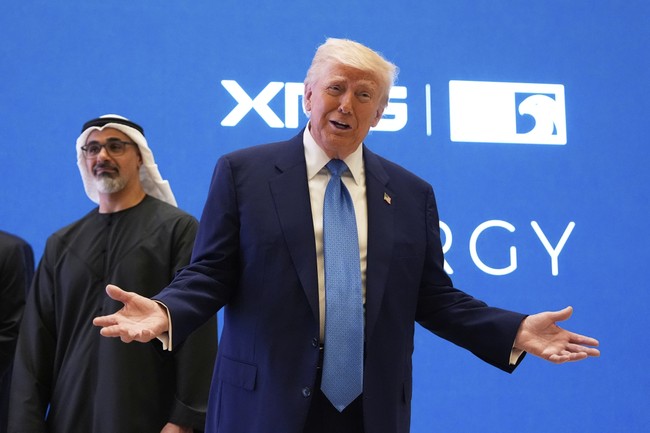
The short answer to that question: appeal to the Supreme Court. The longer answer, especially in time: appeal to Congress. Right now, both appear to have the same prospects … somewhere between slim and none.
Yesterday, the Court of International Trade — yes, we actually have one — overruled Donald Trump’s attempts to vastly expand tariffs against most of the country’s trading partners. Trump had declared a national emergency over the trade deficit and issued a blizzard of new tariffs, claiming authority under the International Emergency Economic Powers Act of 1977 (IEEPA). Unfortunately for Trump, the three-judge panel doesn’t read the IEEPA as a carte blanche on either emergency declarations or plenary authority on tariff applications.
In a per curiam order, the court set aside the tariffs challenged in the action before them, and likely will apply the same result to any other challenges. The opening paragraph succinctly sums up the problem:
The Constitution assigns Congress the exclusive powers to “lay and collect Taxes, Duties, Imposts and Excises,” and to “regulate Commerce with foreign Nations.” U.S. Const. art. I, § 8, cls. 1, 3. The question in the two cases before the court is whether the International Emergency Economic Powers Act of 1977 (“IEEPA”) delegates these powers to the President in the form of authority to impose unlimited tariffs on goods from nearly every country in the world. The court does not read IEEPA to confer such unbounded authority and sets aside the challenged tariffs imposed thereunder.
This might be confusing to readers who know — correctly — that practically every president before Trump applied tariffs. Joe Biden not only kept at least some of Trump’s tariffs, he added some of his own. How could they do that if the Constitution placed that authority in Congress? The answer is: Woodrow Wilson and the Progressives. The ruling doesn’t mention Wilson by name, but during Wilson’s term, Congress began to create bureaucracies to handle these matters and put them under the control of the executive:
As global economic relations grew in volume and complexity, Congress saw a need for specialized, nonpartisan assistance in administering tariffs. See id. at 87. Congress accordingly passed legislation creating the United States Tariff Commission, later renamed the United States International Trade Commission (“ITC”). See id.; Revenue Act of 1916, Pub. L. 64-271, §§ 700–09, 39 Stat. 756, 795–98. To provide this assistance, the Commission “shall have the power to investigate the tariff relations between the United States and foreign countries, commercial treaties, . . . the volume of importations compared with domestic production and consumption, and conditions, causes, and effects relating to competition of foreign industries with those of the United States.” 19 U.S.C. § 1332. The ITC is responsible for maintaining the United States Harmonized Tariff Schedule (“HTSUS”), which sets tariff rates for all merchandise imported into the United States. See id. § 1202. The HTSUS itself “is indeed a statute but is not published physically in the United States Code.” Libas, Ltd. v. United States, 193 F.3d 1361, 1364 (Fed. Cir. 1999). Congress’s enactment of the HTSUS provided that its terms “shall be considered to be statutory provisions of law for all purposes.” Omnibus Trade and Competitiveness Act of 1988, Pub. L. No. 100-418, § 1204(c)(1), 102 Stat. 1107, 1149.
This was all part of Wilson’s plan to create a technocratic bureaucracy to control most of the legislative and executive actions taken by the federal government. Wilson and the progressives insisted that governance was too complicated for laymen to handle and required “experts” to make and enforce the rules. Congress responded to this by punting some of its authority — but not all of it — to the executive branch to make Wilson’s scheme work:
In addition to forming the ITC, Congress has responded to the growing complexity of global economic relations by delegating trade authority to the President. These delegations have included clear limitations that retain legislative power over the imposition of duties and over foreign commerce.
The court then goes to discuss those limitations at length, historically and legally, as well as restrictions on emergency declarations under the National Emergencies Act of 1976. Be sure to read it all, but the court takes a dim view of the latter, especially in Trump’s second term. They seem to have more sympathy for the National Trafficking Emergency involving Mexico, Canada, and China, but not on the trade-deficit emergency applied to all other trading partners. The latter appears to be the real sticking point with this court, and the basis of rejecting the IEEPA use in the Liberation Day policy:
The Constitution provides that “[a]ll legislative Powers herein granted shall be vested in a Congress of the United States.” U.S. Const. art. 1, § 1. Congress is empowered “[t]o make all Laws which shall be necessary and proper for carrying into Execution” its general powers. Id. § 8, cl. 18. The Constitution thus establishes a separation of powers between the legislative and executive branches that the Framers viewed as essential to the preservation of individual liberty. See, e.g., The Federalist No. 48 (James Madison). To maintain this separation of powers, “[t]he Congress manifestly is not permitted to abdicate or to transfer to others the essential legislative functions with which it is thus vested.” Pan. Refining Co. v. Ryan, 293 U.S. 388, 421 (1935); see also Marshall Field & Co. v. Clark, 143 U.S. 649, 692 (1892). …
With these principles in place, the court turns to the interpretive question at hand. Recall that both TWEA and IEEPA authorize the President to “regulate . . . importation.” See 50 U.S.C. § 4305(b)(1)(B); id. § 1702(a)(1)(B). The court in Yoshida II noted that “[t]he express delegation in [TWEA] is broad” and includes the power to “impos[e] an import duty surcharge.” Yoshida II, 526 F.2d at 573, 576. While the words “regulate . . . importation” may exist in identical form in IEEPA, those words do not confer unlimited tariff authority.
And that is why this case is different from previous tariffs applied under the IEEPA. Tariffs applied by Joe Biden, Trump in his first term, and other presidents were targeted rather than broad, let alone global, and not based on the emergency authority under the IEEPA. The court would likely have deferred to the executive in those cases (assuming that a challenge was even brought) because the use of the power didn’t challenge the plenary authority of Congress to set tariff policy. The universal exercise of tariff power in Liberation Day policy blew all of that out of the water, and the court simply cannot ignore the constitutional implications.
Had Trump stopped at the trafficking emergency, would the court have deferred? They argue in this opinion that the trafficking tariffs also violate the IEEPA restrictions on emergency presidential authority in a lengthy section, which isn’t amenable to excerpting. One does wonder, though, whether the court would have found it necessary to act on the trafficking tariffs — which came prior to Liberation Day — if it hadn’t been for the full-blown global tariffs Trump imposed unilaterally on practically everyone else.
Now all of the tariffs under the IEEPA are reversed. (Some of Trump’s tariffs rely on other authorities and are more targeted to products; those are unaffected by this ruling, such as those on autos, steel, and aluminum.) And that means Trump suddenly has no real leverage in trade talks, unless Congress acts to backstop him, or the Federal Circuit appellate court and/or Supreme Court reverses the ruling from the Court of International Trade. The latter seems highly unlikely, for a couple of reasons. First off, the ruling from the CIT is very well laid out and founded on pretty firm con-law and statutory grounds. Second, this is not a case of a rogue district court throwing sand in the gears of executive authority. The CIT is the expert court on trade matters, it had multiple judges involved in the review (appointed by Reagan, Obama, and Trump), and the issue at hand is that the executive branch doesn’t have constitutional authority on tariffs — only whatever power Congress decides to lend the president.
That leaves Congress as a potential life-saver, but the prospects are even gloomier on Capitol Hill. Tariffs would have to be passed on regular order, which means the filibuster would apply in the Senate. Trump’s tariffs are not universally popular even among Republicans, let alone have any hope of attracting seven Senate Democrats to back the Liberation Day tariffs as a slate. It would take months to process, unending negotiations, and likely would produce only a handful of obvious targets that Trump might have gotten with a more modest approach to the IEEPA.
Congress should do something about backstopping the trafficking tariffs, at least, and reset China trade policy with a range of tariff options for Trump to use. Had Trump gone to Congress with these in the first place, would they have acted? Probably not, but at least Trump could have said he tried it the proper way first. Let’s see if Congress will do the right thing after all other options have been exhausted.












